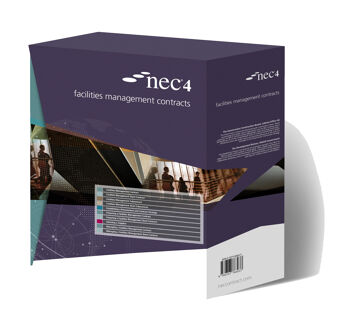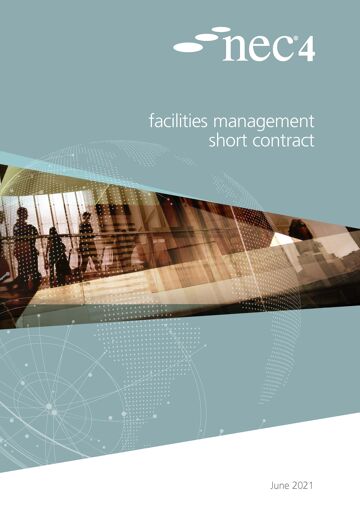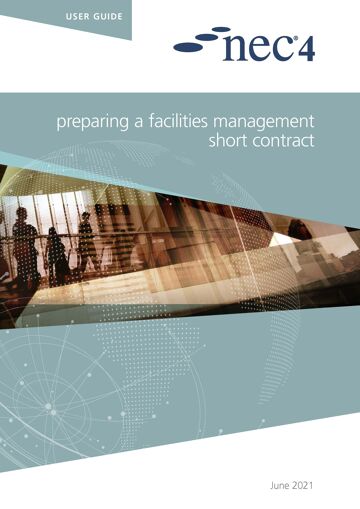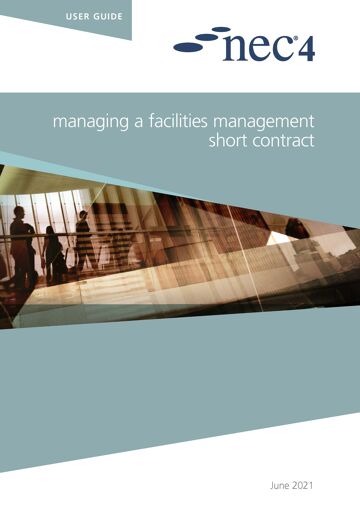Introduction to the NEC4 Facilities Management Short Contract (FMSC)
The NEC4 Facilities Management Short Contract (FMSC) has been developed particularly for the facilities management sector; for those with an asset to maintain or who want a service provided. It is intended for the appointment of a service provider for a period of time to manage and provide a relatively simple, low risk service, such as reactive repairs, security services, cleaning or catering. It provides a modern method for clients and service providers to work collaboratively to achieve their objectives.
People will be motivated to play their part in collaborative management if it is in their commercial and professional interest to do so. Uncertainty about what is to be done and the corresponding risks and liabilities can lead to disputes and confrontation. The FMSC clearly allocates risks, and the collaborative approach will reduce those risks and uncertainty for all the parties.
Delegates attending this course will gain an insight into when to use this form of contract, how to put it together, and how it is managed effectively.
This training course starts at 09:00 and finishes at 17:00 with regular breaks planned throughout the session. All timings, except the start time, are approximate and may be adjusted to suit natural breaks in the lesson.
Session 1 - Overview of the NEC and the Facilities Management Contract (FMC)
- This session shows how NEC contracts have helped transform contractual behaviours and how the FMSC works alongside other contracts in the suite.
- It covers when the FMSC should be used, and its relationship to its subcontract (Facilities Management Short Subcontract, FMSS). Importantly it also considers how work is ordered.
Session 2 - Using the FMSC
- This session covers the standard contract strategy provided by the contract, and the optional choices for the Client. It explains the various contract forms to be completed and how the Price List is completed. It highlights the option of including a Performance Table for setting performance targets and responding to their achievement or failure. It also outlines the difference between defined and identified terms, their significance in the contract and the Contract Data and how they should be used.
Session 3 - Managing the contract - the FMC processes
- 3.1 - General provisions. This session looks at the general techniques that are used to manage the contract including mutual trust and co-operation, communications, the role of the Service Provider and (optional) Client’s Agent, early warnings, and Service Orders and their requirements.
- 3.2 - Service Provider’s main responsibilities. This session outlines the Service Provider’s main responsibilities; covering how the service is provided, its people subcontracting.
- 3.3 - Time. This session considers when the service starts and finishes, and the option of a plan.
- 3.4 - Quality management. This session clarifies how service failure is identified and managed throughout the service period.
- 3.5 - Payment. This session covers how amounts for payments are calculated and invoices submitted. It includes when payments should be made, inflation, and the Performance Table.
- 3.6 - Compensation events. This session gives an overview of what compensation events are and how they should be managed to ensure neutral cost to the Service Provider and transparency and fairness to the Client. It includes an explanation of Defined Cost.
- 3.7 - Use of equipment, and Plant and Materials. This section will review how the use of equipment passes between the Parties, particularly at the end of the contract.
- 3.8 - Liabilities and insurance. This session looks at the way the contract deals with liabilities and maintains a risk profile which complies with the overarching NEC principle of mutual trust.
- 3.9 - Termination and dispute resolution. This session deals with the process of termination, the reasons why the termination process can be invoked, and the process for dispute resolution.
Session 4 - Summary and open forum
- Describe the philosophy of NEC and the behaviours needed to ensure success
- Understand when to use this contract rather than the more detailed Facilities Management Contract
- Appreciate the use of Contract Data, Scope and the optional Performance Table
- Define the roles and responsibilities of key parties
- Apply important FMSC clauses such as Service Orders, early warning, the plan (if required), communications and compensation events
- Know how to instruct Service Orders
This course is designed for those working with the FMSC form including:
- Clients
- Facilities managers
- Consultants
- Service providers and their supply chain.
It is designed for those with minimal experience with NEC contracts or the FMSC form but can be beneficial to those wishing to recap their knowledge.





